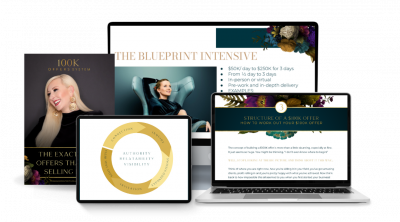Are you struggling to find the perfect pricing strategy for your coaching business? Look no further! In this comprehensive guide on coaching pricing, we’ll explore the factors that influence coaching fees, discuss various pricing models, and reveal proven strategies for creating attractive coaching packages. By the end, you’ll have all the tools necessary to craft a profitable pricing strategy tailored to your unique business.
Key Takeaways
- Develop a pricing strategy that takes into account experience level, niche and specialization, location and cost of living, coaching format.
- Consider hourly vs value-based pricing models as well as retainer/package options to customize prices for different client types.
- Implement customer loyalty programs & referral incentives to reward long term clients & grow your business respectively.
- Many coaches charge over 100k as a coach because they know how to position themselves effectively at the premium, ultra-premium or luxury end of the market.
Understanding Coaching Pricing Factors
For both life coaches and business coaches, determining the right fees for your coaching services sets the foundation for a profitable online coaching business. Several factors contribute to determining the appropriate fees, including:
- Experience level
- Niche specialization
- Location
- Coaching format
Grasping these factors and their impact on your coaching fees is key to fostering successful coaching engagements and maintaining competitive pricing within the industry.
Experience Level
It’s no secret that experience plays a significant role in determining coaching fees. Typically, more experienced coaches charge higher rates than those just starting in the industry. This is because experienced coaches bring valuable knowledge, leadership skills, and professional development insights to the table, which clients are often willing to pay a premium for.
For coaches, personal development and expertise refinement can pave the way for higher fees and a more diverse client base. Being a part of the International Coaching Federation can further enhance their credibility in the field.
Niche and Specialization
Another factor that can impact coaching fees is niche and specialization. Clients often seek coaches with specific knowledge and experience tailored to their unique needs. By focusing on a particular niche or area of expertise, you can differentiate your services from other coaches and become more attractive to clients seeking specialized guidance.
Take the example of a coach specializing in healthcare management; they may command higher fees than a general business coach, given their targeted and valuable expertise in the healthcare industry.
However, in our experience working with 100k Coaches, there is an opportunity in every niche we have encountered to charge significant premium, ultra-premium or luxury rates. With the right positioning, offer and marketing strategy, every niche has an elite opportunity to charge 100k+ as a coach.
Coaching Format
Your coaching service’s format can also impact the pricing. Common formats include:
- In-person coaching, which often commands higher fees due to the added value of face-to-face interaction
- Online coaching, which can be more accessible and affordable for clients with limited budgets or busy schedules
- One-on-one coaching, which provides personalized attention and guidance
- Group coaching, which allows for shared learning and support
Consider the pros and cons of each format when determining your pricing strategy.
Group coaching sessions, on the other hand, may be priced lower than one-on-one coaching session, but can attract more clients and generate higher overall revenue. By offering a variety of coaching formats, including life coaching sessions, you can cater to a wider range of client needs and preferences.
For 100k Offer Coaches, you will generally be working 1:1 or privately with clients to achieve 100k or even multi-million dollar coaching packages.
Developing Your Coaching Pricing Model
Developing your coaching pricing model involves considering various approaches, each having its distinct benefits and possible challenges. In this section, we’ll explore hourly vs. value-based pricing, retainer and package pricing, and customizing prices for different client types.
A thorough grasp of each model’s pros and cons will equip you with the insight needed to choose an effective pricing strategy for your coaching venture.
Hourly vs. Value-Based Pricing
Hourly pricing is common among new coaches, as it provides a simple and straightforward way to charge for coaching services. The client pays a predetermined rate per hour, making it easy for both parties to understand the cost of the coaching engagement.
Yet, as your experience and expertise grow, a shift towards value-based pricing could be beneficial. With this approach, you focus on the results and impact your coaching services create, rather than the amount of time spent with a client. This allows you to charge higher fees that reflect the true value of your coaching, rather than simply billing for time spent.
Retainer and Package Pricing
Another popular pricing model is retainer and package pricing. Retainer pricing involves clients paying a fixed fee, typically on a monthly basis, to secure ongoing coaching services. This ensures a consistent and predictable income for you as a coach and offers your clients continuous support.
Package pricing, on the other hand, involves offering a set of coaching services at a discounted rate. This can be appealing to clients who want to commit to a longer-term coaching relationship and save on costs.
By offering a variety of retainer and package options, you can cater to different client needs and preferences, helping to grow your coaching business.
Customizing Prices for Different Client Types
When shaping your coaching pricing model, consider customizing prices for different client types. By offering tiered pricing options, you can cater to clients with varying budgets and needs.
For example, you might offer a lower-cost group coaching program for clients who cannot afford one-on-one coaching, or a premium package for clients who require more intensive support. By tailoring your prices to the needs of your target audience, you can attract a wider range of clients and ensure that your coaching services are accessible and valuable to all.
A Note on Pricing for 100k+ Coaches
There is an elite group of coaches who are exceptional at what they do who can command pricing at 100k+ for their coaching services. They typically are pricing their coaching as a private package as most elite clients are looking for experience, effectiveness and efficiency as well as discretion. Many of our million-dollar coaches are packaging their services with equity and performance bonuses, and steer clear of anything to do with hourly pricing models. Learn more about how to do this at the 100k Offer System.
Setting Your Life Coaching Fees
Determining the right fees for your life or business coaching services is a pivotal aspect of forging a successful coaching enterprise. In this section, we’ll explore the process of setting life coaching fees, including conducting market research and competitor analysis, setting personal income goals, and aligning fees with client needs.
Taking these factors into account will empower you to establish fees that are not only competitive but also mirror the value you deliver as a coach.
Market Research and Competitor Analysis
Market research and competitor analysis are essential tools for setting competitive life coaching fees. By understanding the industry landscape and the fees charged by other coaches in your niche, you can make informed decisions about your own pricing strategy. This can help you identify opportunities for differentiation, such as offering specialized services or targeting underserved market segments.
Additionally, competitor analysis can provide insights into the pricing strategies that work best for coaches with similar experience levels and expertise, allowing you to set fees that are in line with market expectations.
Personal Income Goals
Setting personal income goals is another important factor to consider when determining your life coaching fees. By establishing a clear target for your desired yearly revenue, you can calculate the number of clients and coaching fees necessary to achieve this goal. This can help you determine the optimal pricing strategy for your coaching services, ensuring that you earn a sustainable income while still providing value to your clients.
Remember that your income goals may change over time as your coaching business grows, so it’s important to regularly reassess your fees and pricing strategy to ensure they remain aligned with your financial objectives.
Aligning Fees with Client Needs
Finally, it’s essential to align your coaching fees with the needs of your target clients. This means taking into account factors such as the clients’ budgets, the value they perceive in your coaching services, and the specific needs and goals they have.
By ensuring that your fees are in line with what your clients are willing and able to pay, you’ll be more likely to attract and retain clients who find value in your coaching services. This, in turn, will help you build a successful and profitable coaching business.
A Note on Setting Coaching Fees for 100k+ Life Coaches
As a 100k Coach, you are in a position to work with a smaller group of elite clients and go much deeper with them, allowing you to charge more for your experience, transformational outcomes and the proximity to you. Elite clients are willing to invest 100k+ for these services, and in many instances over a million dollars; but the inclusions, packages and deliverables will be quite different to a standard coaching arrangement. Learn more about how to do this at the 100k Offer System.
Business Coaching Pricing Strategies
Pricing strategies in business coaching can vary from those utilized in life coaching. In this section, we’ll focus on setting fees for executive coaching and leadership development services, two common areas of specialization within the business coaching industry.
Grasping the unique pricing considerations for these services can guide you in setting competitive fees that embody the specialized knowledge and expertise needed to coach high-level professionals.
Executive Coaching Fees
Executive coaching fees are typically higher than those for general business coaching, due to the specialized knowledge and expertise required to coach high-level professionals such as CEOs, executives, and other executive leaders. Executive coaches are often in high demand for their ability to help these professionals reach their full potential.
When setting executive coaching fees, you should consider factors such as the scope and complexity of the coaching program, the coach’s experience and qualifications, and the level of the executive being coached. By aligning your fees with the unique needs and expectations of executive clients, you can ensure that your coaching services are both valuable and competitive within the executive coaching market.
Leadership Development Pricing
Leadership development pricing can vary based on the specific coaching program and the coach’s experience and qualifications. As with executive coaching, leadership development services often require a higher level of expertise and specialized knowledge, which can command higher fees.
When setting prices for leadership development services, consider factors such as the scope of the coaching program, the specific skills and tools being taught, and the coach’s experience in developing effective leaders.
By aligning your pricing with the value and impact of your leadership development services, you can attract clients who are willing to invest in building their leadership skills and professional development.
A Note on Setting Coaching Fees for 100k+ Life Coaches
As a business coach at the most elite end of the market, you will be charging a minimum of $100k, and can package your coaching services into bundles that include equity, performance bonuses and even exit fees. Keep in mind that the inclusions for million dollar packages as a business coach will be extremely precise and streamlined, and the expectation is you will go very deep and be a powerful force helping leaders achieve major outcomes for a large fee. Learn more about how to do this at the 100k Offer System.

Creating Attractive Coaching Packages
Designing appealing coaching packages serves as an effective method to draw potential clients and foster long-term commitments. In this section, we’ll explore strategies for bundling services, offering discounts and incentives, and providing flexible payment options.
Applying these strategies can result in coaching packages that cater to a broad spectrum of clients, thereby fostering growth in your successful coaching business.
Bundling Services
Bundling services allows you to offer a variety of coaching options at different price points, catering to a wider range of clients. For example, you might offer:
- A package that includes one-on-one coaching sessions
- Group workshops
- Access to online resources
- A package that combines business coaching with personal coaching services
By bundling services together, you can create unique and attractive offerings that appeal to clients with varying needs and budgets, helping you expand your client base and increase your revenue.
Offering Discounts and Incentives
Offering discounts and incentives can be an effective way to attract new clients and encourage long-term commitments to your coaching services. For example, you might offer a discount on the initial engagement for new clients, or a loyalty discount for clients who commit to a certain number of coaching sessions.
By providing incentives for clients to invest in your coaching services, you can build a stronger relationship with your clients and foster a sense of loyalty that leads to long-term success.
Providing Flexible Payment Options
Providing flexible payment options can make your coaching services more accessible and affordable for clients with varying budgets. For example, you might offer installment payments or payment plans for clients who cannot afford to pay for a coaching package in full.
By accommodating the financial needs of your clients, you can attract a wider range of clients and ensure that your coaching services are accessible to all who can benefit from them.
A Note on Creating 100k Offer Coaching Packages
There’s a world of difference between mainstream coaches and those who command six-figure sums for their expertise. These high achievers, known as 100k Offer Coaches, cater to an elite clientele with a minimum pricing of $100,000 per annum for their services. The 100k Offer coaching package may seem surprisingly lean, but it is precisely this effectiveness, efficiency, and capacity for transformative experiences that the high-level clients you’ll be working with demand. They aren’t fussed about your courses or worksheets. To create your own 100k Offer packages as a coach, use the 100k Offer System 2.0 which is the proven system that hundreds of elite coaches are using to create 100k, 250k, and even million dollar packages as a coach. Start here.
Implementing Customer Loyalty Programs
Customer loyalty programs serve as an efficient method to acknowledge long-term clients and inspire them to maintain their investment in your coaching services.
In this section, we’ll explore strategies for rewarding long-term clients and creating referral programs that incentivize clients to refer new clients to your coaching business.
Rewarding Long-Term Clients
Rewarding long-term clients with discounts or additional services can help foster a sense of loyalty and encourage client retention. For example, you might offer a discount on future coaching sessions for clients who have completed a certain number of sessions, or provide free access to online resources or group coaching sessions as a reward for their commitment.
Acknowledging the worth of your long-term clients and appreciating their loyalty enables you to foster robust relationships, setting the stage for sustained success and growth of your coaching venture.
Referral Programs
Referral programs incentivize clients to refer new clients to your coaching business, helping to grow your client base and increase your revenue. For example, you might offer a discount on future coaching sessions for clients who refer a new client to your coaching services.
By creating an incentive for clients to spread the word about your coaching services, you can expand your reach and attract new clients who might not have otherwise discovered your business.
A Note on Incentives for 100k Offer Coaching Packages
Most coaching programs are looking to get a transformational outcome for their clients and then move on. For 100k Coaches, we are looking to get the transformation and then create a way to continue to work with them in the longer term, rewarding their loyalty and creating ever growing expanded offers for them that may look like VIP Clubs. Learn more about the 100k Offer System here.
Summary
In conclusion, finding the right pricing strategy for your coaching business is crucial for success. By exploring various pricing strategies, determining your ideal coaching rates, and adjusting them over time, you can maximize revenue while providing value to your clients. Remember, the key to a successful coaching business lies in balancing value and affordability to attract and retain clients. Embrace the journey and watch your coaching business thrive!
Pricing for 100k Offers
For a small percentage of coaches, there is an opportunity to price offers at the 100k+ range. You need to be extremely good at what you do, be willing to position yourself at the very top of your niche and then market effectively to clients who have the resources to invest at this level. If this sounds like something you would love to do with your business, the best place to start is the 100K Offer System which is the proven system that allows coaches to transform their proven offers way beyond high ticket into the realm of $100k Offers+. Learn more about the 100k Offer System at the 100k Offer System Masterclass which takes you through the system in detail here.
Frequently Asked Questions
How much should I charge as a coach?
On average, executive coaches charge around $350 an hour. A six week engagement with one hour-long session per week usually costs $2,100, but rates can range from $200 to $3,000. Elite coaches can sell offers at 100k+ per client. Learn more about the 100k Offer System at the 100k Offer System Masterclass which takes you through the system in detail here.
How much does a group coaching program cost?
Group Coaching typically costs between $1,000 to $4,000 per person for a 6 month period. For a premium coach, this can be $8k+ per month including equity or incentive bonuses.
How can I create attractive coaching packages?
Create attractive coaching packages by bundling services, offering discounts and incentives, and providing flexible payment options to appeal to a variety of clients. If you are exceptional at what you do and you know you are undercharging at these rates, consider becoming a 100k Offer Coach where you are achieving 100k as a baseline for your coaching services. Learn more about becoming a premium coach here.









